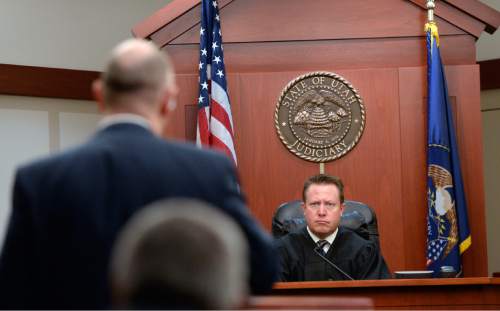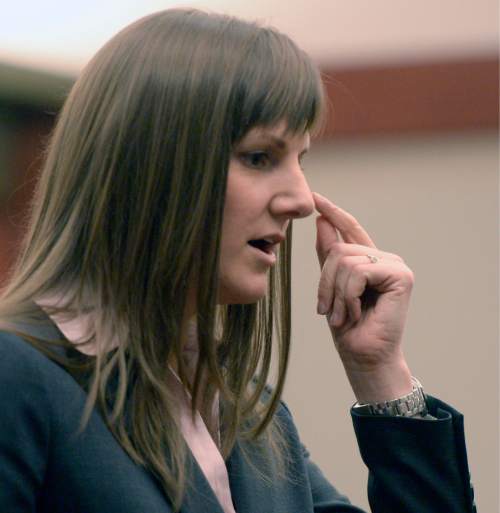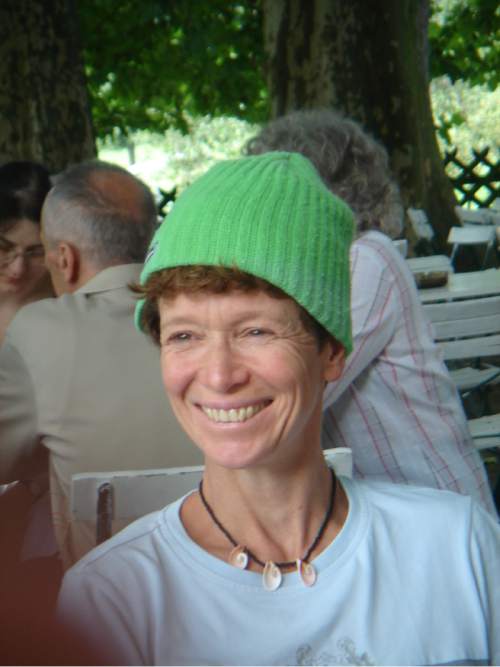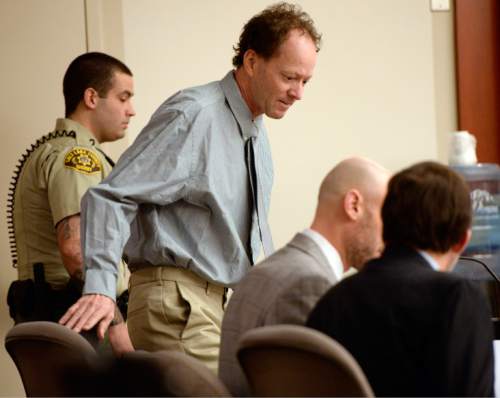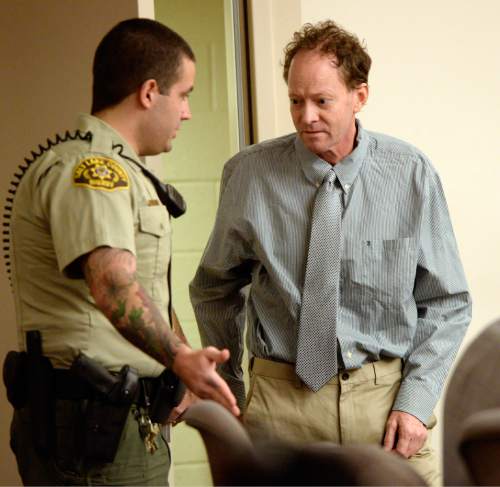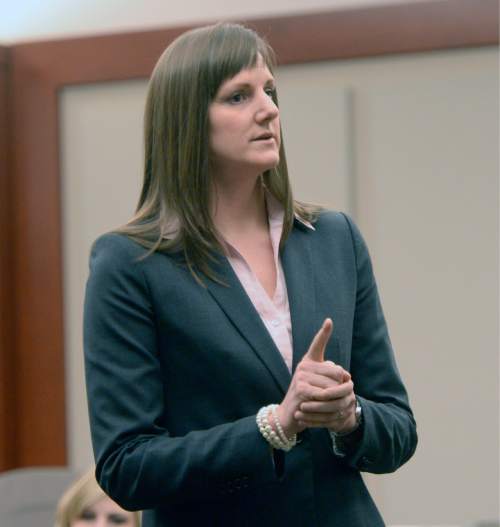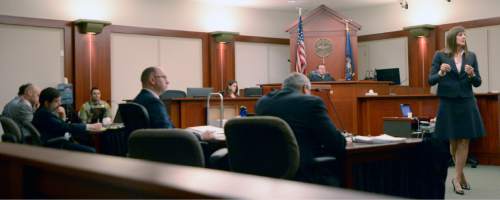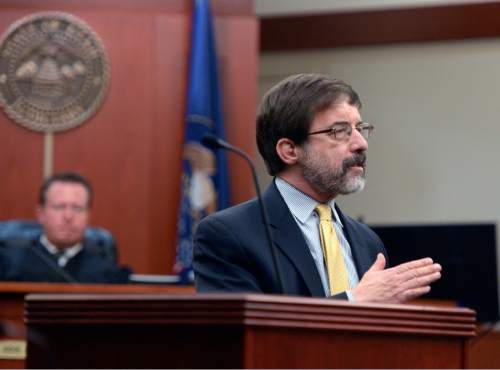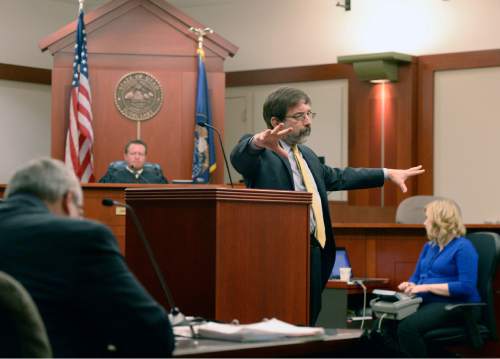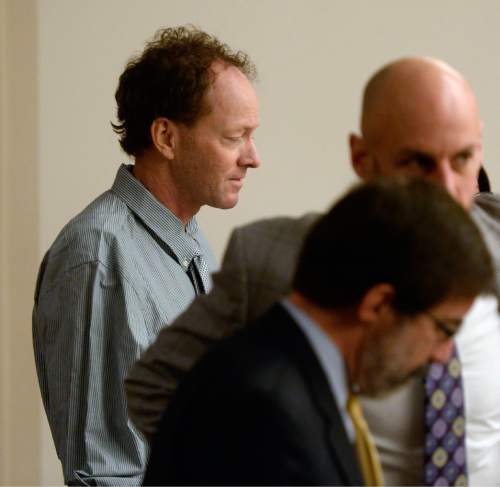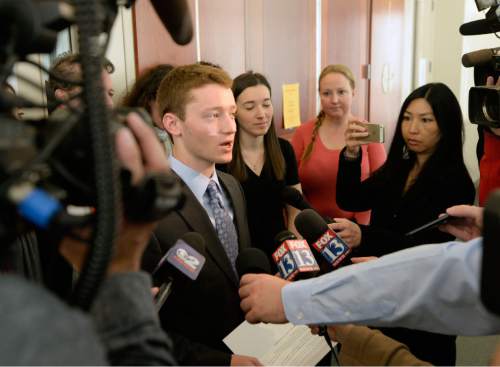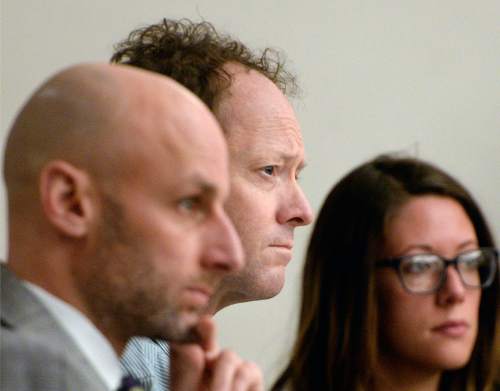This is an archived article that was published on sltrib.com in 2015, and information in the article may be outdated. It is provided only for personal research purposes and may not be reprinted.
Was Uta von Schwedler murdered on Sept. 27, 2011?
And if she was, did her ex-husband, Johnny Brickman Wall, do it?
Those are the two questions that jurors must answer, a prosecutor told them Wednesday morning on the first day of a four-week trial for Wall.
The 51-year-old former Salt Lake City pediatrician is charged with first-degree felony murder.
During opening statements, Deputy Salt Lake County District Attorney Anna Rossi told the 3rd District Court jury that the 49-year-old woman was killed by "someone who simply wanted Uta dead."
"She was absolutely murdered," she said. "And it was this defendant who did it."
Rossi told jurors they ultimately will have to decide whether von Schwedler's death was a homicide or a suicide.
Wall's defense attorney, G. Fred Metos, however, told jurors the evidence doesn't add up to murder.
"It's clear the death was not a homicide," Metos said. "It was either a suicide or an accident."
Von Schwedler was found dead in an overflowing bathtub in her Sugar House home.
Her boyfriend, Nils Abramson, testified Wednesday that he arrived at her home on the evening of Sept. 27, 2011, and went directly to the bathroom because it was the only light on in the house. He testified that he knocked on the door, and said, "Hello?"
"I heard the water running and I opened the door," he testified. "I saw Uta in the tub, underwater. … She was dead. She was stiff as a board."
Abramson said he tried to pull his girlfriend from the chilly water, but he set her down again because she was stiff. He then called 911 — a recording that was played for jurors in court Wednesday.
"She's drowned," he tells dispatchers. "She's dead. … I don't know what happened. She's in the bathtub."
Von Schwedler was wearing only shorts, and there was blood in her bedroom, at the edge of the bathroom sink and on a windowsill, according to an autopsy report.
The medical examiner's office ultimately ruled that the woman — who was a biologist and HIV researcher at the University of Utah — died from drowning. But the medical examiner could not determine whether her death was a homicide or a suicide.
In her system was a fatal or near-fatal amount of the anti-anxiety medication Xanax, for which she did not have a prescription.
Rossi told jurors that it was the Xanax in von Schwedler's system that caused concern for the medical examiner when trying to determine her manner of death.
"[The medical examiner] doesn't know how it got there," Rossi said. "If it wasn't for that Xanax, this would be a homicide for him."
Rossi said von Schwedler never would have voluntarily taken the drug. But Metos told jurors that Xanax is a common medication that can be bought on the Internet and is traded between friends.
The medical examiner also noted sharp-force injuries to the woman's left wrist and left leg "which are not typical of self-inflicted wounds seen in the setting of a suicide." The report said the wounds could be viewed as defensive injuries if the woman had been struggling with an assailant.
As for an apparent struggle in von Schwedler's bedroom, and knife wounds on the woman's body, a defense expert will say there is not enough evidence to show that there was a struggle between two people, Metos told jurors.
"What [the expert] is going to tell you is that this scene is just as consistent with someone who injured themselves, was under the influence of some drug or intoxicant, had difficulty with balance and went into the bathroom and got into the tub," Metos said. "… The evidence is going to show those knife wounds were self-inflicted. The Xanax was most likely voluntarily ingested."
Police began focusing on Wall as a suspect from Day 1. On the evening after his ex-wife's body was found, officers questioned him for four hours, insisting at times that he had killed von Schwedler. When police asked Wall about scratches on his forearms and why one of his eyes was bleeding internally, he claimed "the dog stepped on him" the previous night, according to court documents.
Wall didn't confess that he murdered her, but he told the officers — and later other friends and family — that if he did do it, he didn't remember.
Jurors will see a video recording of this interview with police, Metos said Wednesday, noting that detectives lied to Wall by telling him a neighbor had seen him at von Schwedler's home.
"What you'll see in that video is Johnny's demeanor change," Metos said. "You'll see him question his own sanity. … The officers convinced him, basically, that he was losing his mind."
Witnesses later told police that when Wall returned home after the police interview, he was "upset, mentally unstable and threatening suicide," according to a search warrant affidavit.
Before he was taken to a mental-health facility, Wall told a witness that whoever had killed von Schwedler was a "monster," and he added, "If it was me, I don't remember," the affidavit says.
Wall and von Schwedler had a heated and contentious divorce in 2006 that led to years of custody battles over their four children. Rossi told jurors that the couple fought most frequently about their children, money and scrapbooks that von Schwedler had made through the years.
One of those scrapbooks — depicting photos of their youngest child — was found floating at her feet when Abramson discovered her body, Abramson testified. He also said there was a knife under the woman's body.
During his opening statement, Metos attempted to cast suspicion on Abramson, asking jurors to listen carefully for emotion during Abramson's call to 911. The defense attorney claimed Abramson's voice sounds "almost cold, almost calculated."
Family members for both Wall and von Schwedler attended court Wednesday.
Pelle Wall, the couple's 21-year-old son, believes his father killed his mother.
"The trial is something we have long been awaiting," Pelle Wall told news reporters before the start of trial Wednesday. "We're all a little nervous, but all excited at the prospect of closure. … I always try to do my best to focus on the goodness of her life, not the person who took it away."
Wall has pleaded not guilty. His sister, Wendy Wall, said in a statement Tuesday that their family believes he is innocent.
"We mourn Uta's loss," she said. "We also love Johnny and are confident of his innocence. We believe that when the jury is presented with all the evidence, he will be found not guilty."
When originally charged in April 2013, Wall faced charges of murder and first-degree felony aggravated burglary. Before jury selection Tuesday, prosecutors dismissed the aggravated burglary count.
Wall faces up to life in prison if convicted. He has been held in the Salt Lake County jail in lieu of $1.5 million cash-only bail since his April 2013 arrest.
In June 2013, Wall signed an agreement with the Division of Occupational and Professional Licensing, giving up his medical license and his ability to write prescriptions until the murder case is resolved.
Pelle Wall, filed a petition in court in 2012 — when he was 18 — asking that his three younger siblings be removed from his father's custody. He has told The Salt Lake Tribune that he believes his father killed his mother and was a danger to his siblings.
A judge granted the son's request in April 2013, when a family friend was appointed guardians of the two younger Wall children who were under age 18.
Twitter: @jm_miller


